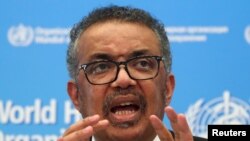Hundreds of scientists participating in a two-day World Health Organization forum have agreed on a strategy for fast-tracking research and development of drugs and vaccines to tackle the deadly coronavirus, which causes what’s known as COVID-19 disease.
WHO said Wednesday that the number of cases of COVID-19 in China was 44,730, including 1,114 deaths. Outside China, there were 441 cases from 24 countries, and one death.
Though the cases and deaths from coronavirus continue to rise, the WHO said the number of newly confirmed cases reported from China had stabilized over the past week. But WHO chief Tedros Adhanom Ghebrehesus said this must be interpreted with extreme caution as the outbreak could go in any direction.
He said he was encouraged by the way the scientific community had come together to fight the mysterious disease. He said researchers had come up with concrete plans and had already begun getting to the bottom of some of the most pressing questions.
“Some of these issues include easy-to-apply diagnostics, the best approaches for infection prevention, potential therapies that could be used to treat patients, existing vaccine candidates and how to accelerate them, and how to address the infodemic,” Ghebrehesus said.
Infodemic refers to misinformation, falsehoods and rumors about the coronavirus that have circulated rapidly on social media, fueling panic among many people.
Four vaccine prospects
WHO Chief Scientist Soumya Swaminathan said there were four vaccine candidates in development. She said it was likely that one or two would go into trial in the next three or four months. She said that would be very rapid progress.
“Similarly for therapeutics, there are a number of existing drugs which have been put forward for testing,” Swaminathan said. “And we have agreed that there will be a master clinical protocol that is developed that again would set out the options for the different drugs that could be tested either singly or in combination. And the faster we can agree on implementing a protocol like that, the more likely that we will get results and be able to use those results, really, to treat patients better.”
In the meantime, WHO said it was continuing to support countries with the tools and equipment needed to diagnose cases and protect health workers. They are the front-line responders to the coronavirus and risk becoming infected by the disease.




